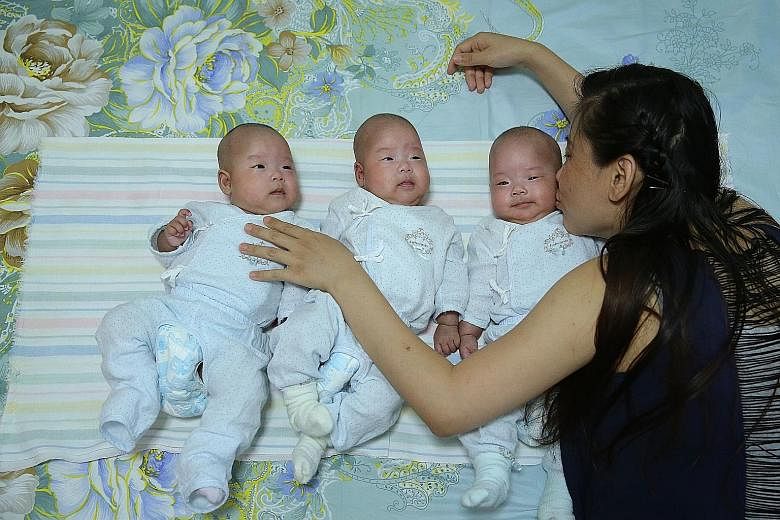SINGAPORE - The youngest has a mole on her right feet. The oldest has a birthmark on her right leg, while the middle one also has a mark on her right leg, but in a different place.
That is how Madam Ning Lei, 35, tells her triplets apart.
Their ears and nose look exactly like their father's, she said. The sisters, who were born at KK Women's and Children's Hospital in July, also have another thing in common - none of them has been granted citizenship.
Madam Ning, a Chinese national, has been unable to contact her Singaporean husband since April. But she needs his identity card to complete the registration of their births.
Under the Constitution, a child born here can apply for citizenship if his parents are married and at least one parent is a Singaporean. In 2013, 30 per cent of all marriages involving at least one Singaporean was to a non-resident - someone who is not a Singapore citizen or permanent resident.
"He doesn't return my calls," said Madam Ning, who, according to her marriage certificate, wedded 35-year-old Gng Cher Kang in August last year. She said they met through a mutual friend in a Chinatown club in May last year. "I liked him because he was a simple man with a good heart," she said.
Madam Ning, who came here in 2013 to work as beautician, left her job after marriage, and accompanied him on his work trips to Wuhan, where he runs a business. After she found out about her pregnancy in February, she moved in with his parents here.
She said she moved out in April as a result of a rift with her mother-in-law and stayed in a hotel with her mother, who came to Singapore then as she was worried.
Madam Ning last saw her husband when he visited her in the hotel in April. She has yet to see him since he left again for China. During her hotel stay, she found out her husband had moved out of their Wuhan home. He changed his office numbers and blocked her on WeChat.
She has filed two police reports on her missing husband. She also applied for a court order to compel her husband to provide her with financial support. When her husband failed to show up for hearings, the court issued a warrant of arrest.
"I want my girls to take up Singapore citizenship. It is their birthright," she said. "Children here also receive better education and health benefits."
She gave birth through a caesarean section about two months short of a full-term pregnancy.
Her in-laws visited her at the hospital twice, but did not say much, said Madam Ning. "My mother-in- law said that it was my decision to bring the triplets to this world, so it is my responsibility to take care of them, not theirs."
When The Straits Times spoke to the mother-in-law last month, she said Madam Ning and her son barely knew each other before they got married. "We are a reputable family. Why would we not want our own grandchildren?"
An Immigration and Checkpoints Authority Singapore (ICA) spokesman said the authorities know of the case, but could not comment to protect the parties' privacy.
Under the Registration of Births and Deaths Act, all births in Singapore have to be registered. For cases where the children's parentage is disputed, both parents will have to resolve the matter, he added.
Madam Ning, who gets help from a church she attends, is now staying at a church friend's home with her mother and the triplets. She is here on a short-term pass and goes to ICA with her mother every two weeks to extend their stay. She said the most pressing concern was the girls' citizenship. "If there are any doubts about parentage, I am willing to send them for DNA tests."
•Additional reporting by Janice Tai


